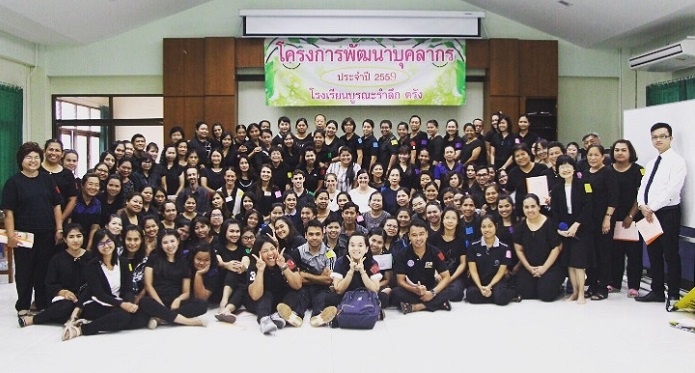What are the Pros/Cons of Teaching English Abroad Through a Government Assistantship Program?
Written By: Chelsea Hendrickx | Updated: June 29, 2023
Written By: Chelsea Hendrickx
Updated: June 29, 2023

While most international English teachers are employed by private language schools across the globe, there are a handful of countries that operate what’s know as a Government Assistantship Program, which provides opportunities for foreign English teachers to work in public schools, including grade schools & high schools. Participants in these program typically assist a native teacher from the local country with English classes, rather than teaching and running a class entirely on their own.
While there are others, here are some of the most popular government assistantship programs for teaching English in public schools abroad:
- JET Program (Japan)
- EPIK (South Korea)
- TAPIF (France)
- Cultural Ambassadors Program (Spain)
- Ministry of Education/SENA Program (Colombia)
Below is a breakdown of some of the aspects of Government Assistantship Programs:
You are an assistant teacher
Pros: If you are new to teaching, the fact that you’ll have a co-teacher can make the transition easier because you won’t be all alone in the classroom. Those with language concerns are put at ease given they are working typically with an English-speaking co-teacher or lead teacher.
Cons: You don’t usually have full control or creativity over lesson plans and what you do in class, which can be frustrating once you get the hang of things. There can be a lot of variability with your co-teacher as well, in terms of how much you are assisting them, or how much they are assisting you! Additionally, students don’t learn as well if lessons are constantly translated by the native teacher.

You get a placement & will secure a job in advance
Pros: More choice is often more paralyzing. You know you want to teach English in Colombia, but that may be where it ends as far as knowing where you want to go. When a program places you in a specific location that has a need can be comforting, and it’s usually going to be somewhere you didn’t know about or wouldn’t have picked yourself. The rural placements of governmental programs tend to be more authentic representations of the country.
Cons: Someone else is picking where you’re going! Maybe you didn’t want to live in a town of 300 on top of a mountain, and are much more of a city person, but there’s little you can do about it if a program decides for you. With private schools, you have much more flexibility in where you go, and in most cases, large cities are the best places to look for jobs, so you don’t need to worry about being in the middle of nowhere.
There is an application timeline with strict deadlines
Pros: A clear timeline gives you clear expectations. For Type A people (author of this article included), having deadlines and clear expectations of when you’ll hear back is comforting, even though it usually makes the process a lot longer.
Cons: Timelines mean less flexibility if you’re looking to get started sooner rather than later or if deadlines are not convenient. If you’re ready to move to France with TAPIF in December, too bad. Applications are due in January and the teaching position doesn’t begin until October, so there’s a lot of waiting. Then, if you miss an annual application date, you often have to wait at least 6 months or a year for the next application period to open.

Strict Eligibility Requirements
Pros: High standards are established for the purpose of ensuring these programs attract high-quality, qualified applicants who are motivated. For example, those who participate in TAPIF are required to possess a working level of French language skills, and for virtually all of these programs, applicants will need to engage in interviews, writing essays and submitting letters of reference to gain acceptance.
Cons: Most of these programs exclude those without a BA, and most have an upper cap on age. The Spanish program is only open to Americans and Canadians. Competitiveness means you may commit to the long timeline for application only to receive bad news at the end.
Pro Tip! Don't put all your eggs in one basket & make sure you have a back-up plan. If you want to teach English in Japan, Korea or Spain, by all means apply for the government programs in those countries. But, keep in mind that there are thousands and thousands of opportunities to teach English in the private sector in private language schools if the big government program doesn't work out for you for whatever reason.

Salaries & Benefits: The program will often help you set up in-country more than a private school would
Pros: Most assistantship programs help with some if not all of the process of moving to a new country, including but not limited to paying for your visa, arranging housing, helping with cell phones/bank accounts, insurance, and other things like registering with the local police/city hall. The Asian programs offer much more assistance than European/South American programs, including housing and/or housing allowances and airfare may be covered as well.
Cons: Sometimes you’re left with little choice in how things get set up, and the level of service is highly dependent on each program. JET and EPIK almost always arrange housing, but TAPIF in France and the Spain and Colombian programs usually don’t.
Finally, one additional thing to note is that pay with a government program is usually less than working for a private language school (whose models are based on profit, so it makes sense). This is especially the case for European programs in France & Spain, where most teaching assistants make less than 1000 euros ($1125 USD) a month. The tradeoff is that you get the support and reliability of a large, government program.
Posted In: EPIK, Teach English in Spain, Teach English in Colombia, Teach English in South Korea, Teach English in France, Teaching Assistant Program in France (TAPIF), JET Program, Teach English in Japan, Teach English in France Must Read
Chelsea Hendrickx
Chelsea grew up in South Florida and attended the University of Florida. Following graduation, she hopped on a plane to teach English in Japan with the JET program for two years. Chelsea has worked as an Admissions Advisor at International TEFL Academy for more than 3 years and has assisted hundreds of ITA students in teaching English in Japan and around the world.
Want to Learn More About Teaching English Abroad & Online?
Request a free brochure or call 773-634-9900 to speak with an expert advisor about all aspects of TEFL certification and teaching English abroad or online, including the hiring process, salaries, visas, TEFL class options, job placement assistance and more.







